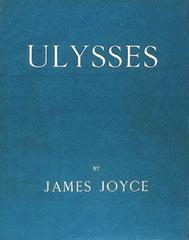 Ulysses by James Joyce is perhaps the best example of the folly that is book censorship, its history a reminder of perils of banning books rather than celebrating the freedom to read. Ulysses was serialized in the United States in the Little Review magazine between 1918 and 1921. Episode 13, "Nausicaa," was deemed obscene under the Comstock Act of 1873, effectively making Ulysses illegal in the U.S. The U.S. Post Office burned hundreds of copies throughout the 1920s. Meanwhile, in Paris, Sylvia Beach of Shakespeare and Company sold copies to visiting Americans, many of which made their way back to the U.S. Prohibition of the book also led to erroneous pirate copies whose errors were replicated in later official versions.
Ulysses by James Joyce is perhaps the best example of the folly that is book censorship, its history a reminder of perils of banning books rather than celebrating the freedom to read. Ulysses was serialized in the United States in the Little Review magazine between 1918 and 1921. Episode 13, "Nausicaa," was deemed obscene under the Comstock Act of 1873, effectively making Ulysses illegal in the U.S. The U.S. Post Office burned hundreds of copies throughout the 1920s. Meanwhile, in Paris, Sylvia Beach of Shakespeare and Company sold copies to visiting Americans, many of which made their way back to the U.S. Prohibition of the book also led to erroneous pirate copies whose errors were replicated in later official versions.In 1933, with the prospect of publishing the first legal U.S. version of Ulysses, Random House hired lawyer Morris Ernst to import the French edition, planning have it seized in Customs and start a legal battle. The specific copy to be seized was stuffed with glowing praise for Ulysses by Ezra Pound and other writers, thus entering into the court record a strong argument for Ulysses as an important literary landmark. The plan almost fell through when Customs officials in New York, suffering on a record hot day, tried to admit the book's bag without searching it. In the subsequent court case, United States v. One Book Called Ulysses, Judge John M. Woolsey ruled against censorship of Ulysses, which allowed the importation of other literary works regardless of sexual content. --Tobias Mutter

